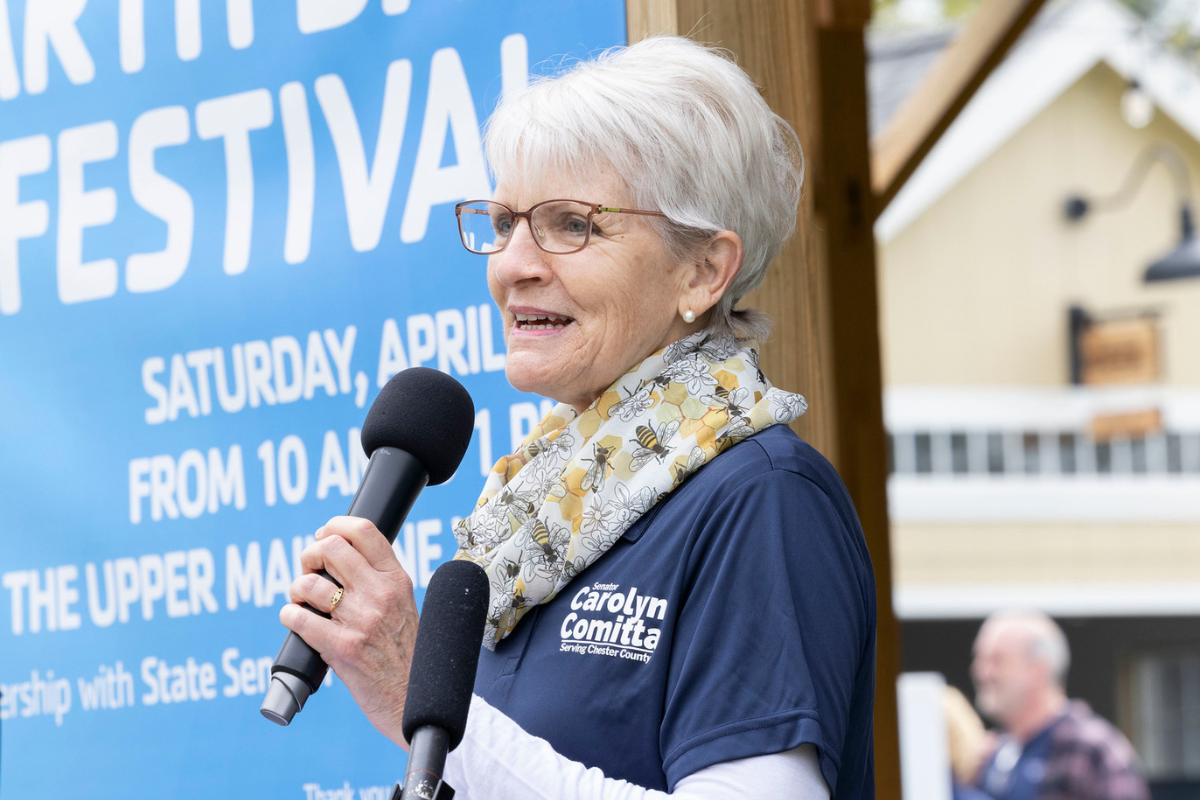
West Chester, PA – May 8, 2024– State Senator Carolyn Comitta today introduced the Pennsylvania Climate Emissions Reduction (PACER) Program, a key part of Governor Shapiro’s energy strategy to reduce emissions, create jobs in clean energy, and cut electricity costs for Pennsylvanians.
PACER, Senate Bill 1191, calls for the Commonwealth to establish a Pennsylvania-specific price on carbon emissions and require large emitters to pay their fair share. The proceeds would be invested in utility rebates and projects that create jobs in clean energy and cut air pollution.
State Representative Aerion Abney introduced companion PACER legislation as House Bill 2275.
 “Pennsylvania accounts for about 1 percent of global emissions. As a major energy-producing state, we have a responsibility to lead the way in addressing climate change. PACER is the way forward to cleaner air, job growth, and consumer savings on electricity bills,” said Comitta, who serves as Minority Chair of the Senate Environmental Resources and Energy Committee. “I thank Governor Shapiro, Rep. Abney, and our legislative partners and co-sponsors for their support of this bold and forward-thinking plan.”
“Pennsylvania accounts for about 1 percent of global emissions. As a major energy-producing state, we have a responsibility to lead the way in addressing climate change. PACER is the way forward to cleaner air, job growth, and consumer savings on electricity bills,” said Comitta, who serves as Minority Chair of the Senate Environmental Resources and Energy Committee. “I thank Governor Shapiro, Rep. Abney, and our legislative partners and co-sponsors for their support of this bold and forward-thinking plan.”
“Right now in our Commonwealth, we must take action to catch up in the race to create clean and reliable energy – to be more competitive, ensure consumers pay less for their electricity bills, and create more jobs and opportunities for our businesses to grow and our workers to get ahead,” said Governor Shapiro. “I have made clear that any energy policy supported by my Administration must meet the three-part test of protecting and creating energy jobs, taking real action to address climate change pollution, and ensuring reliable, affordable power for consumers in the long term – and my energy plan is built to do all three. Together with the support of leaders like Senator Comitta in the General Assembly, we’re going to ensure Pennsylvania will continue to be a national energy leader for decades to come.”
PACER was introduced alongside the Pennsylvania Reliable Energy Sustainability Standard (PRESS) plan, which updates the Commonwealth’s outdated clean-energy targets to both advance climate goals and help Pennsylvania compete for renewable energy projects and clean-energy jobs.
“PACER and PRESS are essential cogs in the machine that is our Commonwealth’s environmental prosperity and posterity. We must fully invest in these programs not just for a greener PA but also for the economic stimulus they would help provide. Thank you to Rep. Friel-Otten and Sens. Comitta and Santarsiero for their collaboration on bringing this component of a budget for all Pennsylvanians closer to fruition,” said Rep. Abney.
Under PACER, the Pennsylvania Department of Environmental Protection will calculate a Pennsylvania-specific cap on carbon emissions and hold our own independent PACER credit auctions. The proceeds will be invested as follows:
- 70 percent returned directly to electricity consumers, including those in rural areas, as an across-the-board, on-bill rebate by the Public Utility Commission (PUC). This reflects the proceeds expected to come from Pennsylvania electricity customers.
- 30 percent to support energy efficiency projects that reduce air pollution in Pennsylvania, invest in new job-creating clean energy projects, and support low-income energy consumers with their energy bills through a year-round LIHEAP program. Of that project funding, 40 percent will be dedicated to directly benefit Environmental Justice communities.
PRESS was introduced as Senate Bill 1190 by state Senator Steve Santarsiero. State Rep. Friel-Otten introduced a companion PRESS bill as House Bill 2277.
Enacting PACER and PRESS is projected to save ratepayers an estimated $252 million, create nearly 15,000 energy jobs, and generate $5.1 billion in investment in clean, reliable energy sources in its first five years.
PACER is an alternative to the Regional Greenhouse Gas Initiative (RGGI), a carbon cap-and-invest program currently made up of eleven Northeast and Mid-Atlantic states. Pennsylvania was set to begin participating in the program two years ago, but it is entangled in an ongoing legal battle. If passed, PACER would take Pennsylvania out of RGGI.
###
